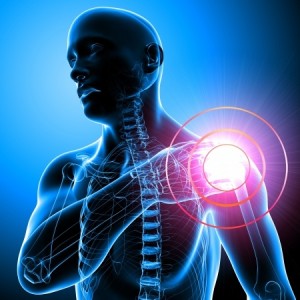Rotator cuff tears are one of the most common shoulder injuries, especially among athletes. Because rotator cuff tears often develop slowly over time, it can be difficult to identify that there is a problem in some cases. Below, we will take a look at some of the common symptoms of this condition, as well as what you can expect in terms of treatment. 
About the Rotator Cuff
The shoulder is a ball-in-socket joint with a wide range of motion. The rotator cuff is a set of four muscles and tendons that connects the shoulder blade to the arm bone, providing stability and flexibility.
Sports such as tennis, golf, and swimming require athletes to repeatedly take the shoulder through its range of motion, and to bear weight on the shoulder. Over time, this can stress the shoulder, especially if the person is training without letting the shoulder recover sufficiently or is using improper form. This can eventually lead to a tear. Older adults are especially prone to rotator cuff tears.
Tears can also occur as a result of acute injury. Acute injury usually occurs as a result of trauma, such as falling or being in an accident. Symptoms may be more immediately noticeable in such instances.
Symptoms of Rotator Cuff Tear
Rotator cuff tears can cause a number of symptoms, although other shoulder conditions can also cause most of the symptoms. Possible symptoms include:
- Shoulder pain, which may get worse when moving the shoulder or lifting it overhead
- Weakness when lifting or moving the arm
- A cracking sensation when moving the arm in certain positions
Rotator cuff tears vary in severity, and symptoms may be more or less severe depending on how severe the tear is.
Diagnosis
Based on a physical examination and discussion of your symptoms, the doctor may suspect the presence of a rotator cuff tear. To actually confirm the presence of the condition, it will be necessary to perform further diagnostic testing. The doctor may order an ultrasound, x-ray, or other imaging test to find out the cause of your symptoms.
The course of treatment depends on the location of the rotator cuff tear and how severe it is, as well as the patient’s lifestyle. If the tear is moderate to severe, it is often necessary to perform surgery. Arthroscopic surgery, which is minimally invasive, can normally be used. Mild to moderate tears may not require surgery, especially if the patient is older or less physically active.
If you are experiencing symptoms of a rotator cuff tear, you should contact a doctor for diagnosis and treatment. To schedule a consultation with Orange County’s top orthopedic surgeon, please click below and enter your information or call OC Orthopedic at (714) 979-8981.



